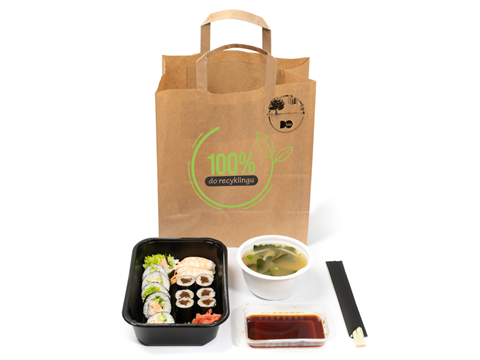
Dobis is converting Mondi’s range of paper grades containing recycled fibres into paper bags for fashion, fast food, and retail products; the move claims to lightweight the packaging and reduce material consumption while maintaining strength and print quality.
Dobis has utilized various papers from Mondi in its converting operations. Eco/Vantage Kraft Pro caters to fast food and grocery applications with ISEGA food approval and 20% recycled content; Eco/Vantage Light Fashion is made from 100% recycled fibres and claims to suit fashion and gift bag applications; and Eco/Vantage Kraft Classic is equally geared towards food and fashion packaging, bringing together a recycled content of 50% and a design that targets strength and printability.
In doing so, the company has transitioned into lighter-weight papers – reportedly without impacting the necessary strength and print quality for premium shopping bags – and claims to balance a reduction in material consumption with an improvement in print results using less ink. Each is expected to benefit Dobis’ sustainability goals.
“Over the past three years, Dobis has relied on Mondi’s broad portfolio of paper products, ranging from 100% fresh fibre to papers with recycled content,” says Gerhard Pachler, regional sales director Specialty Kraft Paper at Mondi. “The collaboration has helped us to do extensive research to test and select the ideal papers for different applications so that Dobis can meet its high quality and efficiency standards.”
“With Mondi, Dobis is pushing the boundaries of sustainable paper bags,” explains Arkadiusz Starzyński, sales director at Dobis. “By using Mondi’s Eco/Vantage paper with water-based inks, Dobis has achieved high-speed production with lower ink consumption and lower costs.
“In addition, by optimizing the paper quality, we have minimized glue consumption during folding and gluing, thereby achieving our sustainability goals.”
The news comes after Welton, Bibby & Baron converted Mondi’s FunctionalBarrier Paper Reduce – described as its ‘thinnest paper possible’ and made with responsibly sourced fibres – into premium bags for pre-packed fresh bread products. These bags are designed to be recycled at end-of-life.
Iceland Foods recently sought to cut its own raw material consumption by 40% with reusable and recyclable carrier bags made from Paptic’s wood fibre-based material. The bag is designed to carry heavy, wet, and frozen goods, and to be folded, stored, and reused multiple times without sacrificing its functionality.
Additionally, Releaf Paper was nominated for a Sustainability Award in 2023 for its recyclable and biodegradable shopping bags made from fallen leaves. Since then, its bags have been utilized by Uber Eats, providing Parisian eateries with eco-designed packaging for food deliveries via its Green Packaging Marketplace.
If you liked this story, you might also enjoy:
The ultimate guide to the Packaging and Packaging Waste Regulation in 2024
How are the top brands progressing on packaging sustainability?
Sustainable Innovation Report 2024: Current trends and future priorities
Everything you need to know about global plastic sustainability regulation













No comments yet